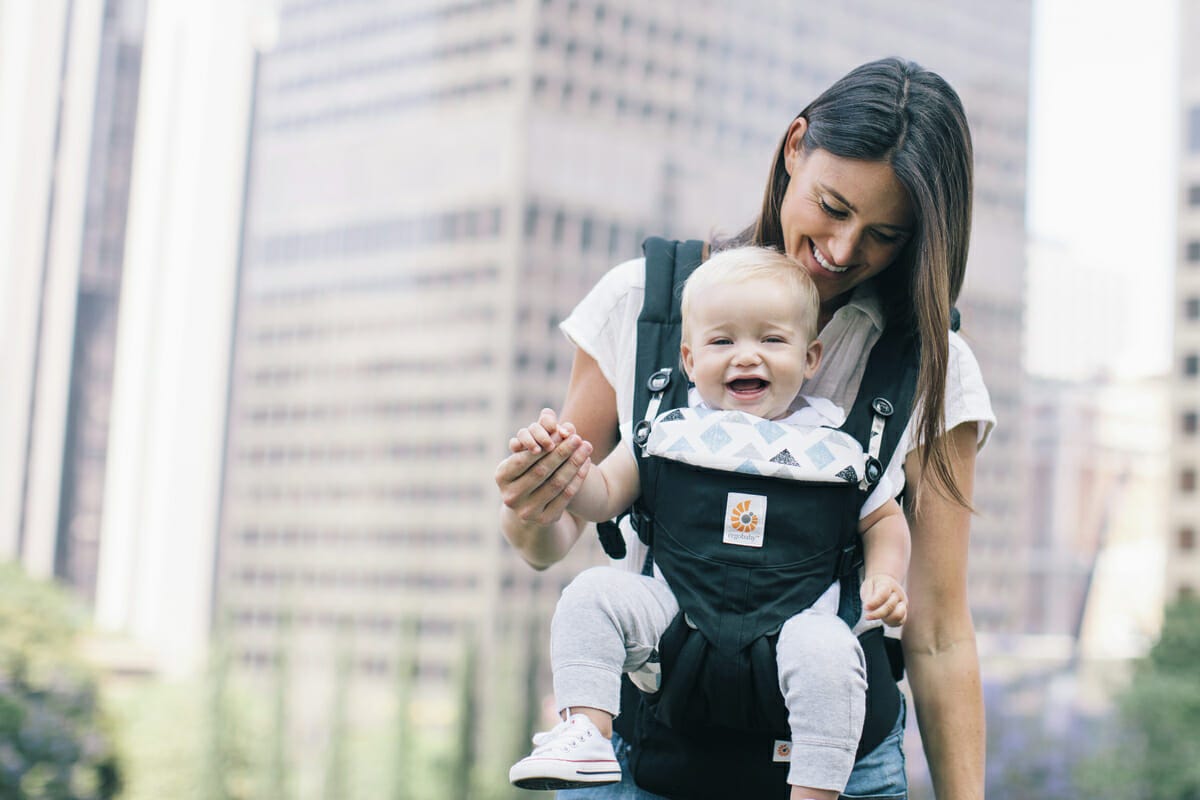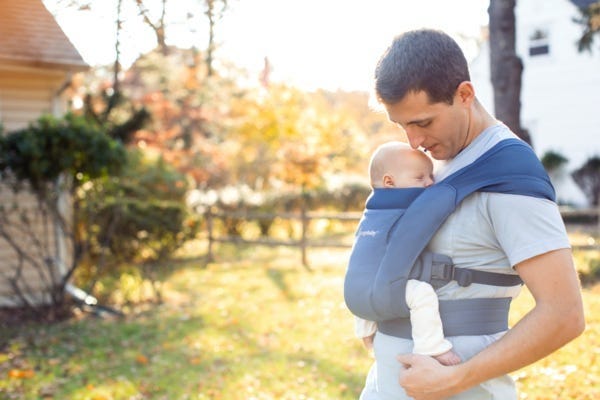
1. Take time to check in with yourself.
Amidst the chaos of full houses and family gatherings, the “noise” can make it hard to hear your own needs and feelings. Find an excuse to take 15 minutes by yourself. Practice whatever helps you clear your mind, such as deep breaths, stretching and yoga, a mindfulness meditation, a bubble bath, music, or a walk outside. With extra family around, you may have extra childcare and unprecedented opportunities for a quick break alone.2. Take time alone with your baby.
New babies are very popular at family gatherings. Take some time to be “selfish” with your baby and be alone, just the two of you, or with just your nuclear family. Holiday travel and large gatherings can be very overwhelming to little ones. And an unsettled baby makes for an unsettled parent. Breastfeeding moms and babies may find it especially important to find a quiet space alone and to not let too much time go by between feedings. Skipping feedings and holiday stress can cause a decrease in milk supply, which only leads to more stress.3. Try to keep some of your routines.
While some of our schedule goes out the window during the holidays, keeping some familiar patterns in the day will help you as well as your little one. Daily walks, healthy snacks, naps and quiet time are especially important to keep up.4. Keep your baby close.
Remember that YOU are your baby’s comfort zone. You are your baby’s home. Whether traveling through airports or in a loud family party, your baby will be happiest while you or your partner is wearing him in a baby carrier. If sleeping in a strange environment, the closer she is to you, the more relaxed she will be and the more sleep you will all get.5. Be strong in your boundaries with family.
Say “no” when it is important. Everyone has an opinion of how to care for a baby. You, as the parent, get to decide. Listen to your inner voice and instincts. In addition, you may find old family dynamics are stressful. Many times when we return home to extended family, old, unhealthy patterns can reemerge. If there are no tense or complicated issues at all in your family, congrats, you are lucky. If they are, congrats, your family is normal!6. Be flexible in your expectations of family.
Try to accept family members and old friends as they are. Expect that they are going to have opinions with which you disagree. Know that you don’t have to respond to, argue with or follow their advice. Let everything that bothers you roll off like water on a ducks back. Decide if it is a priority to hash everything out, or if you would rather stick to neutral topics.7. Set aside differences.
Pick your battles. Fundamental differences are not going to be resolved during one visit. Understand others may be feeling the effects of holiday stress and depression, too. Try to listen for their best intents. Focus on what you have in common and enjoyable.8. Acknowledge sad feelings.
If you have had a recent loss or trauma, or if it near the anniversary of the death of a loved one, realize that it is normal to feel sadness and grief. It's okay to take time to cry or express your feelings. Don’t force yourself to be happy all the time if you are not.9. Put your oxygen masks on first.
When traveling on a plane with a small child or someone needing your assistance, the advice is to put your oxygen mask on first. Our instinct is to take care of our needs only after everyone else has been tended to. But if we pass out from lack of oxygen, how will we be able to help them? Make it a priority to take care of yourself. For moms, I call this “mothering the mother.” Doing so allows us to better take care of those that need us.10. Reach out.
If you feel lonely or sad, talk with someone. If you do not feel your family understands, reach out to your “mama tribe,” or to friends who do. If you are having serious distress or thoughts of suicide, call a hotline, such as 800-273-TALK (8255) in the US or Canada.11. Seek help.
If you have tried many of these strategies, and are still feeing sad or blue, or unable to enjoy the aspects of the holidays that you usually enjoy, you may want to consult with a professional. If you are feeling this way more often than not, and if it has lasted more than two weeks, a psychotherapist or doctor may be able to help. In my private practice in San Diego, I help clients develop a custom plan for soothing self-care and “mothering the mother.” This page on Postpartum Progress, lists providers in the US, Canada, UK and Australia, who specialize in mental health for pregnant and postpartum women.12. Enjoy!
Rejoice in your baby’s first holiday. Get excited in experiencing the holidays through a small child’s eyes. Celebrate reuniting with loved ones and seeing them with your babies. Focus on the joy and light. Know that the darkness passes. For some (see #11), professional help can speed up the process, but remember it gets better. Enjoy the fun in the meantime.Emotional Benefits of Getting Outside
Spending time in nature with your baby can strengthen the bond between you. The simple act of holding your baby close, feeling their warmth, and sharing new experiences together can create strong emotional connections. It’s also a wonderful way to reduce stress and improve your mood. When my littles were extra fussy, I’d take a walk around the neighborhood. Even though I don't live in an area with trails and surrounded by nature, simply behind outside changed everything. A little vitamin D does wonders!
Cognitive Development
Nature is a sensory wonderland for babies. The different sights, sounds, and smells can stimulate your baby’s senses and promote cognitive development. Watching leaves rustle, hearing birds chirp, and feeling the texture of a tree bark can all contribute to their learning and development.
All About Baby Carriers for Nature Adventures
Choosing the Right Baby Carrier
When it comes to selecting the best baby carrier for summer adventures, there are several options to consider.
Types of Baby Carriers:
- Wraps: Perfect for newborns, providing a snug and secure fit.
- Slings: Ideal for quick and easy use, offering good ventilation.
- Soft Structured Carriers: Versatile and comfortable for both parent and baby, suitable for longer trips.
Factors to Consider:
- Baby’s Age and Weight: Ensure the carrier is appropriate for your baby’s size and weight. For example, Ergobaby’s Embrace Newborn Carrier is perfect for the fourth trimester where baby is small and you’re looking for an easy way to stay close. As they grow, you’ll want to upgrade to an all-position carrier that’s meant for growing babies.
- Parent’s Comfort and Ergonomics: Look for carriers with padded shoulder straps and lumbar support if you’re planning on longer outings.
- Ease of Use: Choose a carrier that is easy to put on and take off.
- Climate and Breathability: Opt for carriers made of breathable fabrics to keep you and your baby cool in hot weather.
Safety Tips:
- Proper Positioning: Ensure your baby is seated correctly, with their legs in an "M" position and their head should be close enough to kiss.
- Checking for Wear and Tear: Regularly inspect your carrier for any signs of damage.
- Ensuring Adequate Support: Make sure the carrier provides proper support for your baby’s head and neck.
Exploring Nature with a Baby Carrier
Ideal Spots for a Nature Walk with Baby
- Parks and Gardens: Great for leisurely walks and picnics.
- Nature Trails and Forests: Perfect for more adventurous outings.
- Beaches and Lakesides: Wonderful for enjoying the water and sand, with the right carrier.
Activity Ideas
- Hiking: Enjoy a scenic hike with a hiking baby carrier that offers support and storage.
- Bird Watching: Use your carrier to keep your baby close while you explore and observe wildlife.
- Picnics: A carrier can free up your hands, making it easier to carry picnic supplies.


Advantages of Using Strollers for Nature Adventures


While baby carriers are fantastic for mobility and closeness, depending on the adventure of choice you might want to be a stroller along too.
There are a LOT of baby stroller options on the market. So we understand how confusing it can be to choose the one that’s right for your family. Not only are there a variety of brands, but a variety of strollers that serve different purposes.
There are a few types of strollers on the market:
- Full-sized stroller: This is typically the stroller parents thing of buying for all its versatility.
- Lightweight or umbrella stroller:These compact strollers are perfect for on-the-go adventures.
- Jogging stroller: Designed for parents who want to combine fitness with outdoor adventures.
- Double stroller: Designed for parents with multiple kids, especially twins.
- Car seat carrier: These strollers connect to a specific car seat. We don't typically recommend these as they can be unsafe for baby and uncomfortable for parents who are pushing.
Learn more about the types of strollers and which one would be best for you.
Benefits of Bringing a Stroller
- Storage Space for Gear: Ample room for carrying all your essentials like a diaper bag, beach toys and more.
- Shade and Weather Protection: Built-in canopies to shield your baby from the sun when they are lounging.
- Options: If you have more than one kid, you can stroll with one and carry the other. Or, if you’re getting warm or your little one is getting fussy, you can switch up their position from stroller to carrier or vice versa.
Safety Tips for Strollers
- Ensure your stroller is in good working condition. Make sure buckles are still buckling and that there are no rips or holes that could compromise your baby’s safety.
- Use sunshades or bug nets to protect your little one’s skin.
- Securing the baby properly: always buckle up your baby for safety even if you think they are old enough to go without the buckle.
Combining Baby Carriers and Strollers
For the ultimate flexibility, consider using both a baby carrier and a stroller on your outings.
Combining both options allows you to adapt to different situations. Use the carrier for more rugged trails and switch to the stroller for smoother paths or when your baby needs a nap.
Transition Tips
- Smooth Transitions: Plan stops where you can easily switch from carrier to stroller.
- Pack Light: Only bring essentials to make transitions easier.
Tips for a Successful Adventure
Planning Ahead
- Route Planning: Choose baby-friendly trails and parks. Check local mom groups or outdoor groups and get recommendations for the best outings for kids.
- Check Weather Conditions: Avoid extreme heat or unpredictable weather. Even with our most breathable carriers, when it’s hot, it’s hot. And having two bodies against each other in the heat will be naturally hot and sticky already.
- Packing Checklist: Include diapers, snacks, water, sunscreen, and a first-aid kit. These all-position carriers have storage pockets where you can fit some of the items easily!
- Stay Hydrated and Nourished: Pack healthy snacks to keep energy levels up and bring plenty of water for both you and baby.


Summer adventures with your baby are a wonderful way to create lasting memories and enjoy the beauty of nature together. From baby carriers to strollers, Ergobaby products are designed to provide comfort and ease for both you and your little one. So, gear up, get outside, and explore the world with your baby by your side.
Ready to embark on your own summer adventures? Check out Ergobaby’s range of baby carriers and strollers to find the perfect match for your family’s needs. Visit our website today and start planning your next outdoor excursion!




























